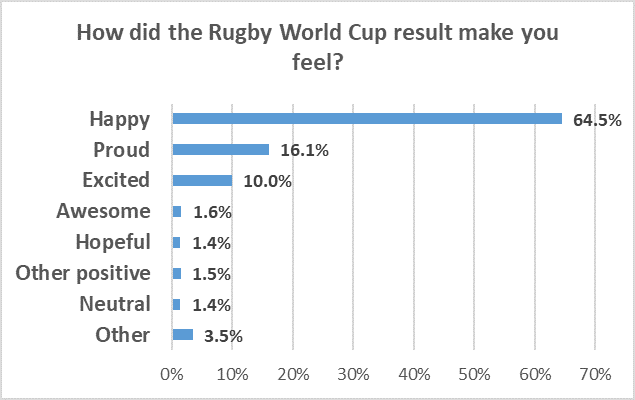Pretoria, Monday 18 November 2019 – Following the recent triumph of South Africa’s national rugby team at the 2019 World Cup in Japan, the Human Sciences Research Council working with Cape Town based company biNu (www.bi.nu), sought to understand national sentiment about this international achievement.
The survey was conducted over four days amongst users of the popular #datafree Moya Messenger platform which has 1.5 million users in South Africa and elicited responses from 6 945 survey respondents.
The survey aimed to assess respondents’ awareness of the success of the Springboks, how this made them feel, the role of sports in South Africa, how South Africans feel about sport, popularity of team members and whether South Africans support rugby in general. Approximately 93% of the respondents were under the age of 40, with a gender split of 33% female to 67% male respondents.
An overwhelming 99% of the 6 945 respondents said that they were aware of the achievement of the Springboks.
When asked about how this made them feel, respondents articulated the following dominant sentiments: ‘happy’ (65%), ‘proud’ (16%), ‘excited’ (10%) and ‘awesome’ (2%).
A further 88% of respondents said that sport adds to their sense of belonging to South Africa while 85% thought that sport can help South Africa to deal with xenophobia and racism. A large proportion of foreign nationals among the sample (living in South Africa) indicated agreement with these statements.
When asked to name their favourite player in the Springbok team, the captain, Siya Kolisi came out on top with 49%, followed by Cheslin Kolbe (14%), Makazole Mapimpi (9%), Tendai Mtwarira (8%), Faf de Klerk (4%) and Handre Pollard (3%). Two percent said that they liked all team members equally.
Interestingly, despite the positive sentiments related to South Africa’s performance at the tournament, only 39% of respondents regularly watch rugby matches, while 38% watch sometimes. One-fifth (20%) watched the RWC final match only, and 3% never watch rugby. Asked to name their favourite team in any sport, 29% explicitly mentioned the Springboks or another local or international rugby team, while 71% mentioned the names of other sports teams, especially soccer teams in the South African PSL, the English or other European football leagues.
Mirroring the scenes on South African streets, and within public and private spaces when the Springboks won the World Cup and further when they returned to the country, the data therefore indicates that irrespective of race, gender and employment status, South Africans overwhelmingly believe sport to be a unifying factor in the country’s shared and diverse cultural heritage with the potential to address a number of social and developmental challenges. Sport could therefore be used to drive social cohesion and other national objectives.
The survey was conducted by the HSRC’s Dr Stephen Rule, Dr Saahier Parker and Ms Yamkela Majikijela and biNu’s Mr Gour Lentell and Mr Thomas Chapman.
Please find herewith a link to the coverage of the sentiment analysis on the Springbok win on Bizcommunity.co.za (a marketing platform): https://www.bizcommunity.com/Article/196/19/198014.html

Notes to the Editor
Unpacking the data
About the Human Sciences Research Council (HSRC)
The HSRC was established in 1968 as South Africa’s statutory research agency and has grown to become the largest dedicated research institute in the social sciences and humanities on the African continent, doing cutting-edge public research in areas that are crucial to development.
Our mandate is to inform the effective formulation and monitoring of government policy; to evaluate policy implementation; to stimulate public debate through the effective dissemination of research-based data and fact-based research results; to foster research collaboration; and to help build research capacity and infrastructure for the human sciences.
The Council conducts large-scale, policy-relevant, social-scientific research for public sector users, non-governmental organisations and international development agencies. Research activities and structures are closely aligned with South Africa’s national development priorities.
Join the conversation at:
www.hsrc.ac.za
https://twitter.com/HSRCza
http://www.facebook.com/HumanSciencesResearchCouncil
For more information or to set up interviews, please contact:
Manusha Pillai
Mobile: 082 389 3587
Email: MPillai@hsrc.ac.za
